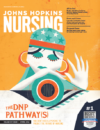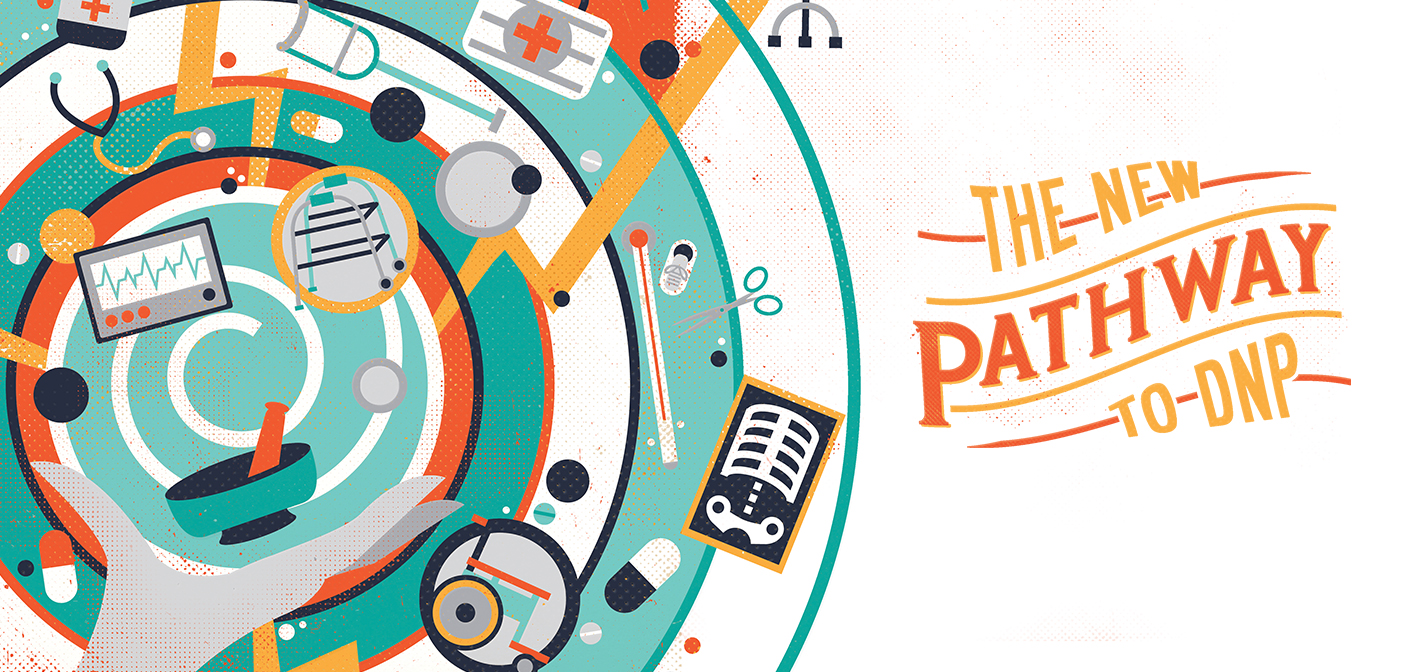Illustration by Robert John Paterson
Now there are two routes to be a nurse health care leader or policy maker
This is a historic and exciting period for nursing as a shortage of physicians and changes brought by the Affordable Care Act offer the profession tremendous growth opportunities. One that is exploding in popularity is the doctor of nursing practice (DNP) degree because of new and convenient pathways for nurses to earn this advanced degree and have greater impact.
The Johns Hopkins DNP program was ranked No. 2 in U.S. News & World Report’s first-ever DNP rankings for 2017. And this advanced degree is changing the world, evidenced by the launch of the first DNP program in Saudi Arabia by the School of Nursing.
“It’s exciting to see the DNP added to the rankings as nursing leadership has become imperative to meeting the needs of our changing populations and health care systems,” says Dean Patricia Davidson, PhD, MEd, RN, FAAN.The NP role has focused on delivering the best possible care to individual patients within the constraints of a given health system.
Now the DNP equips nurses to use advanced knowledge in population health analytics, health services management, and evidence-based practice to improve the health care delivery system and to develop innovative ways to care for groups of patients with chronic illnesses. DNPs are uniquely qualified to promote safety and quality of care, reduce disparities in care, improve outcomes, cut costs, and lead interprofessional problem-solving teams. The DNP prepares nurses to make their marks as leaders of health care systems and policy makers.The existing DNP pathway at the Johns Hopkins School of Nursing is a two-year “Executive DNP” route for nurses who have a master of science in nursing (MSN) degree in a specialty area and are actively practicing in a health care setting.
A new pathway to the DNP, due to launch in the fall of 2017, is for nurses who have a bachelor of science in nursing (BSN) or a generic MSN and are seeking to prepare for the doctoral level role of nurse practitioner (NP) or clinical nursespecialist (CNS). This pathway combines face-to-face and online courses so students can engage in hands-on clinical and health care leadership experiences with colleagues while maintaining the flexibility of online learning. There are three-year and four-year plans of study that will be available pending MHEC approval. The new pathway offers those with a nursing license the option to move to the top of their profession in a relatively short time with the analytical skills they will need to lead the health care industry.
Both routes lead to a DNP degree and a chance to help define the future of nursing, explains Instructor Michael Sanchez, DNP, ARNP, who earned his degree in 2010. “The impact of DNP is still relatively new,” he says. “While the nursing profession as a whole has done a good job of identifying the role of the DNP-prepared nurse, its integration into health care as a larger system continues to evolve.”
This is opening doors for DNPs, and medical systems are waiting eagerly on the other side, according to Deborah Trautman, PhD, RN, FAAN, president and CEO of the American Association of Colleges of Nursing.
“Over the years, requirements for the nursing profession have evolved, consistent with needs of the health care environment,” explains Trautman, formerly executive director of the Center for Health Policy and Healthcare Transformation at Johns Hopkins Hospital. “The DNP prepares nurses for the highest level of clinical practice, which is essential for those looking to make a real impact on transforming systems of care.”“DNP nurses are at the forefront of leading change since they are able to design, evaluate, and continuously improve the context within which care is delivered,” Trautman explains. “Nurses prepared at the doctoral level with a blend of clinical, organizational, economic, and leadership skills are well-positioned to significantly impact healthcare outcomes and promote a culture of good health.”
Upon completing the DNP program, the graduate is prepared to:
- Demonstrate mastery of the role of the advanced practice nurse and population competencies;
- Integrate the art and science of nursing with ethics and the biophysical, psychosocial, analytical, organizational,and public health sciences to improve patient and population health outcomes;
- Demonstrate organizational and systems leadership for quality and safety in care;
- Critically appraise clinical scholarship and analytical methods for evidence-based practice;
- Apply information and technology for the provision and/or transformation of care;
- Leverage interprofessional and multi-sector collaboration for the improvement of individual and population health outcomes;
- Utilize strategies of risk reduction/illness prevention, health promotion, and health maintenance to reduce disparities and improve outcomes for diverse populations;
- Develop leadership for policy and advocacy that shapes health care financing, regulation, access, and delivery.
As for why DNP seekers should choose Hopkins, Sanchez says, “The support from faculty here instills and empowers students to meet these challenges.”
He adds, “Here, we do a good job of encouraging collaboration not only within the DNP and PhD realms but also with other disciplines outside of nursing.”![]() Learn more at nursing.jhu.edu/DNP
Learn more at nursing.jhu.edu/DNP
See videos at nursing.jhu.edu/DNPvoices

